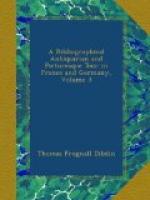Every thing was in readiness—on reaching the bottom of the hill. A pair of small, and apparently young and mettlesome horses, were put to the carriage: the postilion was mounted; and nothing remained but to take our seats, and bid adieu to Chrems and its Monastery. The horses evinced the fleetness of rein deer at starting; and on enquiring about their age and habits, I learnt that they were scarcely three years old—had been just taken from the field—and had been but once before in harness. This intelligence rather alarmed us. However, we continued to push vigorously forward, along a very hilly road, in which no difference whatever was made between ascents and descents. It was a good long sixteen mile stage; and darkness and a drizzling rain overtook us ere we had got over half of it. There were no lights to the carriage, and the road was the most devious I had ever travelled. The horses continued to fly like the wind, and the charioteer began to express his fatigue in holding them in. At length we saw the light of Ens, to the right—the first post town on the high road from Lintz to Vienna. This led us to expect to reach the main road quickly. We passed over a long wooden bridge—under which the river Ens, here broad and rapid, runs to empty itself into the Danube: and... nearer the hour of eleven than ten, we drove to the principal inn in the Place.
It was fair time: and the town of LINTZ was glittering with lights, and animated by an unusual stir of population. The centre of the Place or Square, where the inn is situated, was entirely filled by booths; and it was with difficulty we could gain admission within the inn, or secure rooms when admitted. However, we had no reason to complain, for the chambermaid (an exceedingly mirthful and active old woman) assured us that Lord and Lady Castlereagh on their route to Vienna in 1815, had occupied the very beds which she had destined for us. These beds were upon the second floor, in a good large room, warmed by a central stove of earthenware tiles—the usual fireplace in Germany. The first floor of the inn was wholly occupied by travellers, merchants, dealers, and adventurers of every description—the noise of whose vociferations, and the tramp of whose movements, were audible even till long after midnight.
I am tarrying in a very large, very populous, and excellently well built town. LINTZ, or LINZ, has a population of at least 20,000 souls: and boasts, with justice, not only of its beautiful public buildings, but of its manufactories of stuffs, silks, and printed calicoes. The Place, before this inn, affords evidence of the splendour of these wares; and the interiors of several booths are in a perfect blaze—from the highly ornamented gold gauze caps worn by the upper classes of the middling people, even more brilliant than what was observed at Augsbourg. I was asked equal to four guineas of our money for one of these caps, in my reconnoissance before breakfast this morning—nor, as I afterwards learnt, was the demand exorbitant.




